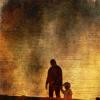We thought we were going to be late. The sunrise ceremony at the cemetery was set to start at 7am, but we didn’t get there until a little before 7:30am. We arrived just as the final preparations were being made, just in time. I was so self-conscious. I felt like everyone was looking at me, at my blue eyes. I am not Native American, and these were not my ancestors we were honoring at this cemetery.
But I was there. The smell of burning sage grounded me as the memories of Canada’s Truth and Reconciliation Commission reminded me of why I was there. I was there to learn the history of the land I now call home--Michigan.
I spread tobacco over the earth as I thanked God, my Creator for allowing me the opportunity to listen with my heart as I participated in this “Honoring, Healing and Remembering” event at Mt. Pleasant Indian Industrial Boarding School (MIIBS).
MIIBS was one of 25 government-run boarding schools across the U.S. that arose out of Richard Pratt’s philosophy: “Kill the Indian and save the man.” Pratt was an Army Lieutenant who started the first boarding school in Carlisle, Pennsylvania. These schools were tools of assimilation: speaking their languages, honoring their cultures, and practicing their spirituality were all forbidden to Native American children at the boarding schools. The schools were run in a militaristic style: children wore uniforms, their hair was shorn into short crewcuts, and they marched from activity to activity in perfect regiments.
During MIIBS’ 41 years of operation, administrative records reported only 5 deaths. In the last few years, researchers have discovered 215 deaths of children who attended the school.
During the day-long event at MIIBS, we were taken on a walking tour of the school grounds. Most of the buildings were unsafe to enter, but the man who led our group told us what each building was used for. After hearing so much about what happened at the boarding school, one thing in particular stick out in my mind: In the Chapel they found a side room, which isn’t uncommon; it is typically used as a musical practice room. This room was carpeted and had no windows, also not uncommon, to dampen the sound. What was odd where the scratches on the walls and door, and there was no doorknob on the inside….We were left to interpret those observations on our own.
What happened at the boarding schools was horrific, and there are lasting, harmful effects to communities. Dr. Maria Yellow Horse Brave Heart describes historical trauma this way: “Historical trauma is identified as accumalitive emotional and psychological wounding over the lifespan and across generations, resulting from a cataclysmic history of genocide.”
Genocide. Now that’s a powerful word. But if you look back at the history of the US, the history not often told in classrooms, there is a shameful past that is hidden behind the silence of us, the white settlers.
As blue-eyed white settler, what is my role in all of this? In an effort to better understand and know the land I live on, I start with listening. I learn. I cannot facilitate the healing, nor start a process of reconciliation - I would just be flaunting my white privilege like the many hundreds of years before - but I can learn what is not taught.
The week before going to Mt. Pleasant, I re-read a sermon on Do Justice, written by Mike Hogeterp of the Centre for Public Dialogue. In the sermon, he includes this quote by Dan, a Lakota elder:
I am not saying that any of this is your fault or even that your grandparents did any of it. I’m saying that it happened, and it happened on your people’s watch. You’re the one who benefited from it. It doesn’t matter that you’re way downstream from the actual events. You’re still drinking the water.
I went to Mt. Pleasant because I drink downstream. As we were leaving the cemetery grounds, a lady came up to me and said, “Thank you for coming today.”
[Image: from Viviana Cornejo of Race Relations]




The Reformed family is a diverse family with a diverse range of opinions. Not all perspectives expressed on the blog represent the official positions of the Christian Reformed Church. Learn more about this blog, Reformed doctrines, and our diversity policy on our About page.
In order to steward ministry shares well, commenting isn’t available on Do Justice itself because we engage with comments and dialogue in other spaces. To comment on this post, please visit the Christian Reformed Centre for Public Dialogue’s Facebook page (for Canada-specific articles) or the Office of Social Justice’s Facebook page. Alternatively, please email us. We want to hear from you!
Read more about our comment policy.